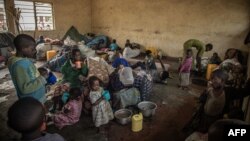The U.N. refugee agency says it will be forced to cut aid programs for millions of internally displaced people and refugees in the Democratic Republic of Congo without an immediate injection of money.
UNHCR says it has received only 19 percent of the $225 million required to run its humanitarian operation this year. That, it says, is not enough to meet the bare minimum let alone respond to the growing needs of millions of people whose lives have been shattered by conflict and violence.
The DRC is home to the biggest displacement crisis in Africa, with more than 5.6 million internally displaced people and over half-a-million refugees and asylum-seekers.
Dominique Hyde, director of the UNHCR's Division for External Relations, returned from a trip last week to strife-ridden Ituri province in eastern DRC. She said she was shocked at the extent of loss and suffering experienced by survivors of ongoing fighting by the many armed groups in the province.
"There was not a single internally displaced person that I met who had not suffered the loss of a family member," Hyde said. "I am meaning their children, their husband, their wives. Or in the case of women who had not been a victim of sexual violence. We, as UNHCR, are providing mental health support and psychosocial support to these women but, honestly, we are only able to do the bare minimum."
She said a lack of funding means the ability to respond to even the most basic needs of the families is not possible. She added that 82 percent of the country's internally displaced people will not receive adequate shelter.
"This means that displaced women, children, men, boys will be forced to sleep in churches, in schools, in stadiums out in the open," Hyde said. "Or they are going to decide to go back to their homes and again being targets of these attacks. I met multiple people who had been displaced multiple times during their lives in the past years or so."
UNHCR warns it will be forced to cut cash and livelihood kits for agriculture, fisheries and livestock if it does not receive additional support. That, it says, will create food shortages for many people. Without more money, it says few refugee children will receive a primary education, which will have a lifelong detrimental effect.
Agency officials say the war in Ukraine has taken the oxygen out of humanitarian appeals for Africa. International solidarity toward people fleeing war in Ukraine has been overwhelming, they note, adding that similar support should be extended to all crises around the world.




